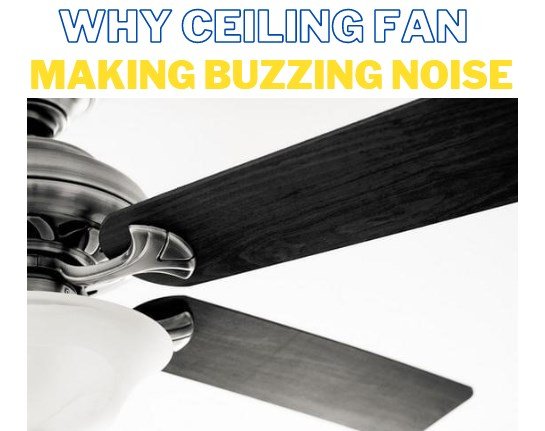If you’re currently dealing with the problem of your ceiling fan making a buzzing noise, then there’s likely to be something wrong with the device. The high-volume sound may disrupt your night and even potentially harm the ceiling, and may present a risk to the house occupants. This noisy ceiling fan may be a sign that your ceiling fan noise needs to be addressed immediately.
There are several different possible causes of a ceiling fan that creates a rustling sound, as explained below.
Why Is My Ceiling Fan Making a Buzzing Noise?
- The use of dimmers
The dimmer switch used to control a ceiling fan is the most common cause of audible humming sound. If you don’t know yet, a dimmer switch is a device that’s not supposed to be used for ceiling fans.
As it cannot and should not be used to control the fan’s speed, it will create a buzzing noise. Replace it with a regular ceiling fan speed control instead.

- The use of remotes
The poor-performing receiver is another potential cause of ceiling fan-bearing noise. The remote control uses the signal from the receiver, which may create a humming sound if it does not work correctly. Try to eliminate the receiver and connect the fan to a direct power source to see if the sound will stop.
- Improperly working capacitors
If you have tried all the previous solutions and the issue won’t cease, the sound may be caused by a poorly working capacitor. To fix this issue, you will have to attempt replacing the capacitors, maybe along with the switch up.
If this is indeed the culprit behind why your fan makes noise when rotating, then the device is likely to suffer from low voltage levels as well, which may cause the engine to struggle. See if the voltage level falls below 105V A/C.
- There are loose screws
Loose screws can cause a ceiling fan to produce rattling noise. This problem should be tackled as soon as possible because the fan blades may endanger the occupants of your house. You need to tighten the screws and ensure that there are no screws with similar conditions within the motor housing as well.
Read also: Causes of Brown Stain on Ceiling
While you’re at it, it’d be wise to check the wire connectors within the switch housing as well. To perform this, you need to turn off the main source of power in the building, then examine if the wire connectors are set securely and are not the cause behind the noise created by your ceiling fan.
- Direct mount to the ceiling
Last but not least, the cause of the ceiling fan makes a buzzing noise because you mount the fan into the ceiling joist directly. This may cause the low noise produced by the fan to be magnified by the joint, therefore making it louder. To lower the sound, you should mount the ceiling fan by setting approved hangers between the ceiling joists, which will isolate the fan.
If you’re planning on new ceiling fan installations, make sure that the fan is installed correctly and that the fan operates smoothly. Check that the blades are loose, and if necessary, tighten them. Regular maintenance, such as dusting the ceiling fan blades, can prevent a lot of issues.
If you’re experiencing a clicking sound or other unusual noises during operation, it’s time to consider repairing the ceiling fan. In some cases, consulting a licensed electrician or a professional electrician might be necessary to ensure the safety and proper functioning of your ceiling fan.
If one of the causes of the ceiling fan making a buzzing noise above is indeed the reason behind your problem, then you’re likely capable of resolving it by yourself.
However, if the issue escalates further, such as if you notice that the fan engine produces sparks and creates bizarre noise, then you need to contact an HVAC expert to address it and resolve it promptly.


